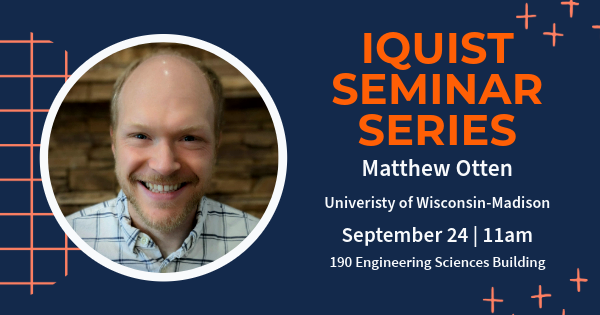NCSA Calendar
NCSA staff who would like to submit an item for the calendar can email newsdesk@ncsa.illinois.edu.

IQUIST Seminar: "Full-Stack Quantum Resource Estimation for Materials Science and Quantum Chemistry," Matthew Otten, University of Wisconsin-Madison
- Event Type
- Seminar/Symposium
- Sponsor
- IQUIST
- Location
- 190 Engineering Sciences Building, 1101 W Springfield Ave, Urbana, IL 61801
- Date
- Sep 24, 2024 11:00 - 11:50 am
- Speaker
- Matthew Otten, Assistant Professor, University of Wisconsin-Madison
- Contact
- Stephanie Gilmore
- stephg1@illinois.edu
- Views
- 301
- Originating Calendar
- IQUIST Seminar Series
Full-Stack Quantum Resource Estimation for Materials Science and Quantum Chemistry
Abstract: As quantum computers rapidly grow in scale and quality, the search has intensified for utility-scale problems that can leverage these advancements. In this seminar, we explore the utility of quantum computers by providing end-to-end resource estimates for industrially and scientifically relevant challenges, from application through quantum algorithm to physical qubits. In the domain of materials science, we study the problem of corrosion, both through the two applications of characterizing magnesium alloy corrosion properties in aqueous environments and identifying stable niobium-rich alloys with corrosion resistance at temperatures above 1500K. In the domain of biology and medicine, we look at the application of calculating binding affinities in amyloid beta, an intrinsically disordered protein which plays an important role in neurodegenerative diseases like Alzheimer's disease. When using the quantum phase estimation algorithm, and requiring a guarantee of success, we find that utility-scale problems require thousands to hundreds-of-thousands of logical qubits and 10^13 to 10^19 logical T gates, with physical runtimes 28 years or greater. This points to the need to reduce overheads across the board, from a more compact chemical description, to better quantum algorithms, better error correction schemes, and faster physical operations.
Bio: Matthew Otten is an assistant professor of physics at the University of Wisconsin–Madison, specializing in theoretical quantum information science. He earned his PhD from Cornell University, was a Maria Goeppert Mayer fellow at Argonne National Laboratory, and previously worked at HRL Laboratories. Otten’s research aims to accelerate the realization of utility-scale quantum computing, focusing on the development of quantum algorithms and the simulation of physical qubits to improve the efficiency and viability of quantum technologies. He is particularly interested in applying quantum computing to real-world challenges in materials science and biology.
To watch online go to the IQUIST youtube channel: https://www.youtube.com/channel/UCCzAySwQXF8J4kRolUzg2ww
For Zoom link you may check the IQUIST calendar weekly email or contact Stephanie Gilmore (stephg1@illinois.edu). To subscribe to our weekly email for event announcements, please go to https://lists.illinois.edu/lists/subscribe/iquist-announcements.